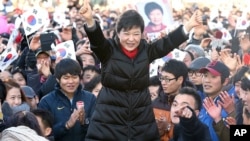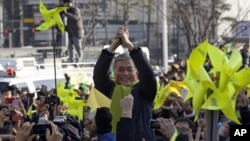SEOUL —
Park Geun-hye, the daughter of a former South Korean dictator, and Moon Jae-in, the former chief of staff of another previous president, are locked in a tight race to determine who will be South Korea's new leader.
The election takes place Wednesday to replace President Lee Myung-bak, who is constitutionally limited to a single five-year term.
Park, if elected, would become South Korea's first female president and the first to follow a parent into the Blue House. Her father, Park Chung-hee, was president from 1961 to 1979.
During a news conference Tuesday, the candidate of the conservative Saenuri (New Frontier) Party borrowed the “Let's Live Well” slogan from her father's era, reminding people of the economic growth that came under his leadership.
Park says she will restore the “collapsed middle class” so that it encompasses 70 percent of the population and revives the “economic miracle” realized under her father's rule.
The liberal Moon of the Democratic United Party has also vowed to address the increasing income disparity in Asia's fourth largest economy, which both candidates acknowledge has widened under the administration of the incumbent President Lee Myung-bak.
Moon says he will be a president “who wipes away the peoples' tears.”
Speaking to reporters on the eve of the election, Moon also vowed to be “the president of jobs,” while supporting welfare for those who are ill or cannot work, and a “healing president” who would ease the pain of ordinary people and bring comfort to what he called their lives of relative deprivation.
Moon was the chief of staff to President Roh Moo-hyun, who was in office between 2003 and 2008.
Opinion polls
The latest pre-election public surveys indicate Park maintains a narrow lead over Moon.
Political analyst Hwang Tae-soon of the Wisdom Center think tank says North Korea's provocative multi-stage rocket launch that propelled an apparently non-functioning satellite into space last week does not seem to have influenced South Korean voters, even though it proved to be a rare propaganda victory for the impoverished and isolate North over its wealthier rival.
South Korea has tried and failed three times to launch a satellite into space.
Hwang points to already established policy differences between the two candidates regarding North Korea.
Moon has pledged to hold a summit with North Korea in the first year of his presidency. Park says she will not agree to any summit until Pyongyang apologizes for its military provocation that occurred in recent years.
Park's mother, First Lady Yu Young-soo, was shot dead in 1974 by a pro-North Korean agent.
Park Chung-hee took power after leading a 1961 coup and led the country until his assassination by the head of his intelligence agency in 1979. His legacy makes some liberal voters uncomfortable about voting for his daughter. But others say the autocrat should get credit for presiding over strong economic growth, and Park Geun-hye should not be saddled with the taint of the repression that permeated her father's rule.
About Moon
Her opponent is the son of refugees from the North. He organized student protests against Park Chung-hee's autocratic government. As a result, he was forcibly conscripted into the military. Moon later became a prominent human rights lawyer and eventually a close aide to President Roh, who committed suicide in 2009, after he left office, amid an investigation into a bribery scandal.
Another key contrast between the two candidates, according to Wisdom Center political analyst Hwang, is their stance on South Korea's power “chaebol” business conglomerates.
Hwang notes that Park has toned down calls to reform the conglomerates, taking a moderate approach focusing on fair trade. Moon, he explains, wants restrictions on cross-shareholdings by the giant corporate groups, which are blamed for suffocating smaller-sized firms.
Moon also wants revisions to the controversial free trade pact with the United States. Park says the agreement is good as it stands, unless problems arise during its implementation.
Moon's candidacy received a late boost when a high profile independent, Ahn Cheol-soo, a wealthy entrepreneur popular with young voters, dropped out of the race and urged his followers to vote for Moon, although his support was seen by many as lukewarm.
Lackluster campaign
Asan Institute for Policy Studies president Hahm Chai-bong says, overall, this campaign does not seem as exciting as past South Korean presidential elections.
“There's something about this election that just doesn't energize people. Is it the personality of the candidates? Is it the people just being sick and tired of the political system itself? It's also the longstanding, very sharp bifurcations, the divisions within the country no longer seem to function,” Hahm said in recent remarks at the Seoul Foreign Correspondents' Club.
The National Election Commission forecasts a 70 percent voter turnout. Analysts say Moon needs to see a turnout around 75 percent to boost his chances for a victory.
The elder generation strongly supports Park and has a higher turnout rate on election day than younger voters who are more likely to cast their ballots for Moon.
Youmi Kim in the VOA Seoul bureau contributed to this report.
The election takes place Wednesday to replace President Lee Myung-bak, who is constitutionally limited to a single five-year term.
Park, if elected, would become South Korea's first female president and the first to follow a parent into the Blue House. Her father, Park Chung-hee, was president from 1961 to 1979.
During a news conference Tuesday, the candidate of the conservative Saenuri (New Frontier) Party borrowed the “Let's Live Well” slogan from her father's era, reminding people of the economic growth that came under his leadership.
Park says she will restore the “collapsed middle class” so that it encompasses 70 percent of the population and revives the “economic miracle” realized under her father's rule.
The liberal Moon of the Democratic United Party has also vowed to address the increasing income disparity in Asia's fourth largest economy, which both candidates acknowledge has widened under the administration of the incumbent President Lee Myung-bak.
Moon says he will be a president “who wipes away the peoples' tears.”
Speaking to reporters on the eve of the election, Moon also vowed to be “the president of jobs,” while supporting welfare for those who are ill or cannot work, and a “healing president” who would ease the pain of ordinary people and bring comfort to what he called their lives of relative deprivation.
Moon was the chief of staff to President Roh Moo-hyun, who was in office between 2003 and 2008.
Opinion polls
The latest pre-election public surveys indicate Park maintains a narrow lead over Moon.
Political analyst Hwang Tae-soon of the Wisdom Center think tank says North Korea's provocative multi-stage rocket launch that propelled an apparently non-functioning satellite into space last week does not seem to have influenced South Korean voters, even though it proved to be a rare propaganda victory for the impoverished and isolate North over its wealthier rival.
South Korea has tried and failed three times to launch a satellite into space.
Hwang points to already established policy differences between the two candidates regarding North Korea.
Moon has pledged to hold a summit with North Korea in the first year of his presidency. Park says she will not agree to any summit until Pyongyang apologizes for its military provocation that occurred in recent years.
Park's mother, First Lady Yu Young-soo, was shot dead in 1974 by a pro-North Korean agent.
Park Chung-hee took power after leading a 1961 coup and led the country until his assassination by the head of his intelligence agency in 1979. His legacy makes some liberal voters uncomfortable about voting for his daughter. But others say the autocrat should get credit for presiding over strong economic growth, and Park Geun-hye should not be saddled with the taint of the repression that permeated her father's rule.
About Moon
Her opponent is the son of refugees from the North. He organized student protests against Park Chung-hee's autocratic government. As a result, he was forcibly conscripted into the military. Moon later became a prominent human rights lawyer and eventually a close aide to President Roh, who committed suicide in 2009, after he left office, amid an investigation into a bribery scandal.
Another key contrast between the two candidates, according to Wisdom Center political analyst Hwang, is their stance on South Korea's power “chaebol” business conglomerates.
Hwang notes that Park has toned down calls to reform the conglomerates, taking a moderate approach focusing on fair trade. Moon, he explains, wants restrictions on cross-shareholdings by the giant corporate groups, which are blamed for suffocating smaller-sized firms.
Moon also wants revisions to the controversial free trade pact with the United States. Park says the agreement is good as it stands, unless problems arise during its implementation.
Moon's candidacy received a late boost when a high profile independent, Ahn Cheol-soo, a wealthy entrepreneur popular with young voters, dropped out of the race and urged his followers to vote for Moon, although his support was seen by many as lukewarm.
Lackluster campaign
Asan Institute for Policy Studies president Hahm Chai-bong says, overall, this campaign does not seem as exciting as past South Korean presidential elections.
“There's something about this election that just doesn't energize people. Is it the personality of the candidates? Is it the people just being sick and tired of the political system itself? It's also the longstanding, very sharp bifurcations, the divisions within the country no longer seem to function,” Hahm said in recent remarks at the Seoul Foreign Correspondents' Club.
The National Election Commission forecasts a 70 percent voter turnout. Analysts say Moon needs to see a turnout around 75 percent to boost his chances for a victory.
The elder generation strongly supports Park and has a higher turnout rate on election day than younger voters who are more likely to cast their ballots for Moon.
Youmi Kim in the VOA Seoul bureau contributed to this report.










